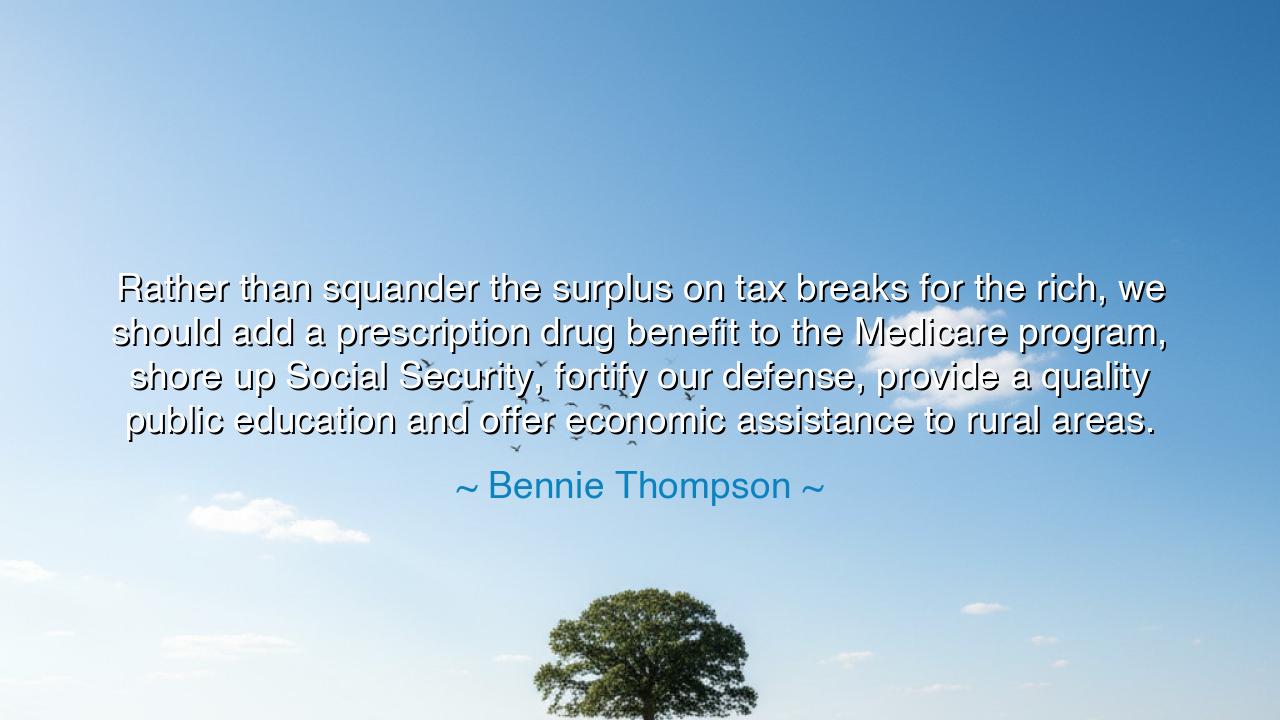
Rather than squander the surplus on tax breaks for the rich, we
Rather than squander the surplus on tax breaks for the rich, we should add a prescription drug benefit to the Medicare program, shore up Social Security, fortify our defense, provide a quality public education and offer economic assistance to rural areas.






The words of Bennie Thompson—“Rather than squander the surplus on tax breaks for the rich, we should add a prescription drug benefit to the Medicare program, shore up Social Security, fortify our defense, provide a quality public education and offer economic assistance to rural areas.”—resound with the force of both justice and foresight. They remind us that the wealth of a nation is not meant to be a bauble for the few, but a foundation for the many. Spoken in a time when America wrestled with choices about its surplus and its priorities, these words shine as a call to stewardship: to invest wisely, to protect the vulnerable, and to build a future where prosperity is shared rather than hoarded.
To speak of squandering the surplus on tax breaks for the rich is to unmask a temptation as old as kingdoms themselves. Again and again, rulers have lavished treasures on the powerful, believing that their wealth would trickle down to others. But Thompson warns that such indulgence is folly, for it deepens inequality and weakens the foundations of society. Instead, he lifts up a vision where the wealth of the people is turned back toward the people, where surplus becomes seed for greater flourishing, not fuel for greater greed.
He names specific pillars: Medicare, Social Security, defense, education, and rural assistance. These are not random choices, but the bones and sinews of a strong nation. Medicare and Social Security sustain the old and the frail, ensuring that years of labor end not in abandonment but in dignity. Defense protects the homeland, not as an idol of war, but as a shield for peace. Education lifts the young, sharpening their minds and giving them power to shape the future. And rural assistance tends to the forgotten places, where prosperity often arrives last, reminding us that the health of a nation depends not only on its cities, but on its fields and towns as well.
History bears witness to the wisdom of such investments. Consider Franklin D. Roosevelt in the years of the Great Depression. Faced with despair, he did not turn to luxury for the wealthy but to programs that lifted the poor, secured the elderly, and built infrastructure that endures even today. Out of crisis came Social Security, public works, and reforms that not only restored stability but also gave hope. FDR’s example reveals the truth of Thompson’s words: when nations invest in their people, they rise; when they neglect them, they fall.
There is also in Thompson’s words a moral weight, a recognition that the measure of a society is not in its palaces, but in how it treats its weakest members. A nation that gives freely to the powerful while neglecting the sick, the aged, the poor, and the children builds its house on sand. But a nation that tends to these first builds upon rock, secure against the storms of history. His vision is not mere economics—it is justice woven into policy, compassion turned into law.
The lesson for us is clear: wealth must be used with wisdom. In our personal lives, as in our national life, we must resist the urge to squander on vanity and invest instead in what endures. Care for the vulnerable. Strengthen the institutions that protect and sustain. Educate the young. Guard the future. What is true for governments is true for individuals: prosperity is not measured in what we keep for ourselves, but in what we sow for others.
So, O listener, let these words of Bennie Thompson be as a guide. Do not envy the wealth that is hoarded, but honor the wealth that is shared. Remember that every surplus, whether of a nation or of your own life, is a sacred trust, a gift to be used for the flourishing of others. Invest in what uplifts, in what defends, in what educates, in what heals. For in this way, you will build not only for yourself, but for generations yet to come. And such a legacy, unlike squandered riches, will never fade.






AAdministratorAdministrator
Welcome, honored guests. Please leave a comment, we will respond soon